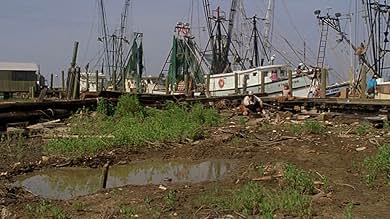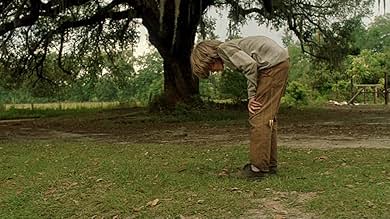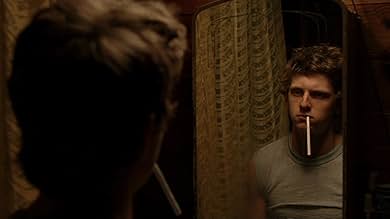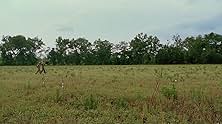PUNTUACIÓN EN IMDb
6,5/10
9,5 mil
TU PUNTUACIÓN
La esposa de un criador de cerdos muere y él tiene problemas con el mayor de dos hijos. Hay más problemas cuando llega su hermano, que acaba de salir de prisión.La esposa de un criador de cerdos muere y él tiene problemas con el mayor de dos hijos. Hay más problemas cuando llega su hermano, que acaba de salir de prisión.La esposa de un criador de cerdos muere y él tiene problemas con el mayor de dos hijos. Hay más problemas cuando llega su hermano, que acaba de salir de prisión.
- Premios
- 3 premios y 6 nominaciones en total
Leigh Higginbotham
- Muriel the Cashier
- (as Leigh Hill)
Argumento
¿Sabías que...?
- CuriosidadesDevon Alan's (Tim) monologue about "Chiggars" was not in the script and was totally improvised by the 11 year old.
- PifiasWhen Chris and Deel go for a drive, the lock button on Deel's door alternates between up and down.
- Créditos adicionales[at the start of the film] The following film was made with the assistance of the Drees County law enforcement agencies and the surviving family of John W. Munn.
- ConexionesFeatured in Siskel & Ebert & the Movies: The Best Films of 2004 (2005)
- Banda sonoraMonster in the Canyon
Written by Mitchell Rothrock, Shane Hartman and Scott Nurkin
Performed by The Dynamite Brothers
Reseña destacada
A teenage boy smashes his would be girlfriend's window and gets chased by the cops. He leaps out of a barn and lands on a plank driving a long nail through his foot but surprises us by keeping on running, howling with pain, plank and all. When he's taken to jail he's patched up and released and given the plank back. When he gets home he carves it into a birthday present, a toy airplane for his little brother. This is how this movie begins.
"Undertow" takes place in an unnamed rural part of Georgia near water where at first we meet two boys, Chris and Tim Munn (Jamie Bell and the young Devon Alan) who live on a small isolated pig farm with their moody father, John Munn (Dermot Mulroney), a widower who's buried himself in this far off place because he can't deal with his wife's passing. (The Munns, the opening titles tell us, were real people in Georgia and this is based on their lives.) Suddenly John's brother Deel Munn (Josh Lucas) unexpectedly appears, just out of jail and full of anger and envy. Even if the father was edgy with the boys, and Chris was obstreperous and Tim was odd, it was a solid little world, but Deel's presence leads to violence and flight. The action hinges on a set of gold coins that have an almost fairy-tale significance, and the Brothers Grimm were an influence on the story.
Yes indeed: the story. This new movie by much admired young American director David Gordon Green arouses disappointment in some of his fans who miss the quirky, stylized meanderings of his "George Washington" and "All the Real Girls," because "Undertow" moves squarely into the more conventional world of plot and action. Others who like myself admired almost everything about his earlier efforts but their lack of a strong narrative line are glad that this time there is one. But no doubt it comes at a price. There's a tug of war between the old Green and the new one going on.
The movie divides itself into the time leading up to the violence and the period of flight and pursuit that ends in climax and denouement. There are those who say "Undertow" is derived from Seventies thrillers or "The Heart Is a Lonely Hunter" or Terrence Malick, whose producer imprimatur the movie bears. These associations pop up because indeed the story is not brilliantly original, even if the texture and look are as distinctive as those of Green's earlier movies. Two thirds of the way through, "Undertow's" narrative arouses expectations of momentum and suspense that are temporarily disappointed, because in the course of flight and pursuit the movie starts to wander a bit. The idiosyncratic dialogue and fresh characters are what makes Green's work so interesting, but they do slow things down, particularly here. In the end neither the die-hard fans nor newcomers will be completely satisfied. It's his very independence that keeps him from completely pleasing anybody but himself.
Green has gone too conventional in some ways, such as cheesy opening titles and an initial series of attention-grabbing freeze-frames, which also continue to reappear sporadically throughout the picture at random moments. The former amateurishness has been replaced with some pointless over-slickness. The cinematography by Green regular Tim Orr is lovely though, with its rich locales and saturated color.
Green's earlier movies fell flat for me -- "George Washington" was singular and engaging but went nowhere, and "All the Real Girls" had more character development but suffered from bad casting and embarrassing dialogue. At its worst moments, which tended to stick in the mind, both movies seemed like Hallmark cards for rural retards.
But "Undertow" does not disappoint, despite its flaws. It retains the distinctive style. And this time because it's successfully plot-driven from very early on, the meanderings -- having a firm foundation in action and character -- come to seem engaging digressions rather than mere self-indulgence. The stuff about a chocolate cake at Tim's ruined birthday party, Chris's run with the plank stuck to his foot, even Tim's disgusting-seeming habit of eating mud and crud and paint and throwing up, wake you up and make you pay attention because of their particularity. It's true that Lucas and Mulroney are too much the Hollywood hunks, just as Zooey Deschanel in "Real Girls" was too much the Indie pinup queen: Green may still have some problems with casting. But not with Jamie Bell, who's about perfect. And he still stays true to the composite southern milieu he grew up in. The grandparents who appear in the denouement are priceless, like so many of the incidental characters.
Deel's arrival at the farm is electric in its effect. From then on the scene is nothing but tension. Mulroney and Lucas, if we discount the too-perfect hunkiness, make a good pair of brothers. Both are big, physical, attractive men whose faces aren't unalike. Mulroney has sullenness about him; Lucas is edgy and aggressive. It turns out John's late wife was Deel's girlfriend first, and John stole her away from him, so the fraternal conflict was truly primal. Their confrontation makes you realize how successfully violence conveys a sense of structure in any story.
After that, the boys run off pursued by Deel, carrying away the gold coins Deel thinks he should have gotten from his father instead of John. There are hints of "Huckleberry Finn" in the boys' adventures when they go wandering on the run from Deel, while the boys' meditative voiceovers suggest Malick. It's strange that the sickly little Tim is the one who runs carrying the bag that has both his books and the couple dozen gold coins in it. But despite such inconsistencies and the suggestion by critics and viewers that the narrative is hackneyed, the treatment and the mood are pure David Gordon Green.
With this third film his methods finally make sense. Rather than thinking of Seventies actioners and the movie "The Heart Is a Lonely Hunter," you'd do better to refer to Carson McCullers, whose novel that film is based on, or to the stories of Truman Capote or Eudora Welty or William Faulkner, or -- closer to today -- the early novels of Cormac McCarthy; or to the photographs of Ralph Eugene Meatyard or Sally Mann. Like those artists, and unlike any Hollywood director, Green has a rich, particular, overripe, deeply southern vision. The fun is in the particularity -- in the cashier, for instance, who flirts with Deel and chokes on her gum; in her mechanic husband who rambles on about some obscure musical group called the Storics; in Tim's storytelling from his books and the way he is filing them at home according to their smell. "Despite a few narrative confusions," Jonathan Rosenbaum has written of "Undertow," "I found it pure magic." You could be cynical and say it would take magic to justify the confusions. But Rosenbaum isn't far wrong. For whatever faults it has, "Undertow" really sings.
"Undertow" takes place in an unnamed rural part of Georgia near water where at first we meet two boys, Chris and Tim Munn (Jamie Bell and the young Devon Alan) who live on a small isolated pig farm with their moody father, John Munn (Dermot Mulroney), a widower who's buried himself in this far off place because he can't deal with his wife's passing. (The Munns, the opening titles tell us, were real people in Georgia and this is based on their lives.) Suddenly John's brother Deel Munn (Josh Lucas) unexpectedly appears, just out of jail and full of anger and envy. Even if the father was edgy with the boys, and Chris was obstreperous and Tim was odd, it was a solid little world, but Deel's presence leads to violence and flight. The action hinges on a set of gold coins that have an almost fairy-tale significance, and the Brothers Grimm were an influence on the story.
Yes indeed: the story. This new movie by much admired young American director David Gordon Green arouses disappointment in some of his fans who miss the quirky, stylized meanderings of his "George Washington" and "All the Real Girls," because "Undertow" moves squarely into the more conventional world of plot and action. Others who like myself admired almost everything about his earlier efforts but their lack of a strong narrative line are glad that this time there is one. But no doubt it comes at a price. There's a tug of war between the old Green and the new one going on.
The movie divides itself into the time leading up to the violence and the period of flight and pursuit that ends in climax and denouement. There are those who say "Undertow" is derived from Seventies thrillers or "The Heart Is a Lonely Hunter" or Terrence Malick, whose producer imprimatur the movie bears. These associations pop up because indeed the story is not brilliantly original, even if the texture and look are as distinctive as those of Green's earlier movies. Two thirds of the way through, "Undertow's" narrative arouses expectations of momentum and suspense that are temporarily disappointed, because in the course of flight and pursuit the movie starts to wander a bit. The idiosyncratic dialogue and fresh characters are what makes Green's work so interesting, but they do slow things down, particularly here. In the end neither the die-hard fans nor newcomers will be completely satisfied. It's his very independence that keeps him from completely pleasing anybody but himself.
Green has gone too conventional in some ways, such as cheesy opening titles and an initial series of attention-grabbing freeze-frames, which also continue to reappear sporadically throughout the picture at random moments. The former amateurishness has been replaced with some pointless over-slickness. The cinematography by Green regular Tim Orr is lovely though, with its rich locales and saturated color.
Green's earlier movies fell flat for me -- "George Washington" was singular and engaging but went nowhere, and "All the Real Girls" had more character development but suffered from bad casting and embarrassing dialogue. At its worst moments, which tended to stick in the mind, both movies seemed like Hallmark cards for rural retards.
But "Undertow" does not disappoint, despite its flaws. It retains the distinctive style. And this time because it's successfully plot-driven from very early on, the meanderings -- having a firm foundation in action and character -- come to seem engaging digressions rather than mere self-indulgence. The stuff about a chocolate cake at Tim's ruined birthday party, Chris's run with the plank stuck to his foot, even Tim's disgusting-seeming habit of eating mud and crud and paint and throwing up, wake you up and make you pay attention because of their particularity. It's true that Lucas and Mulroney are too much the Hollywood hunks, just as Zooey Deschanel in "Real Girls" was too much the Indie pinup queen: Green may still have some problems with casting. But not with Jamie Bell, who's about perfect. And he still stays true to the composite southern milieu he grew up in. The grandparents who appear in the denouement are priceless, like so many of the incidental characters.
Deel's arrival at the farm is electric in its effect. From then on the scene is nothing but tension. Mulroney and Lucas, if we discount the too-perfect hunkiness, make a good pair of brothers. Both are big, physical, attractive men whose faces aren't unalike. Mulroney has sullenness about him; Lucas is edgy and aggressive. It turns out John's late wife was Deel's girlfriend first, and John stole her away from him, so the fraternal conflict was truly primal. Their confrontation makes you realize how successfully violence conveys a sense of structure in any story.
After that, the boys run off pursued by Deel, carrying away the gold coins Deel thinks he should have gotten from his father instead of John. There are hints of "Huckleberry Finn" in the boys' adventures when they go wandering on the run from Deel, while the boys' meditative voiceovers suggest Malick. It's strange that the sickly little Tim is the one who runs carrying the bag that has both his books and the couple dozen gold coins in it. But despite such inconsistencies and the suggestion by critics and viewers that the narrative is hackneyed, the treatment and the mood are pure David Gordon Green.
With this third film his methods finally make sense. Rather than thinking of Seventies actioners and the movie "The Heart Is a Lonely Hunter," you'd do better to refer to Carson McCullers, whose novel that film is based on, or to the stories of Truman Capote or Eudora Welty or William Faulkner, or -- closer to today -- the early novels of Cormac McCarthy; or to the photographs of Ralph Eugene Meatyard or Sally Mann. Like those artists, and unlike any Hollywood director, Green has a rich, particular, overripe, deeply southern vision. The fun is in the particularity -- in the cashier, for instance, who flirts with Deel and chokes on her gum; in her mechanic husband who rambles on about some obscure musical group called the Storics; in Tim's storytelling from his books and the way he is filing them at home according to their smell. "Despite a few narrative confusions," Jonathan Rosenbaum has written of "Undertow," "I found it pure magic." You could be cynical and say it would take magic to justify the confusions. But Rosenbaum isn't far wrong. For whatever faults it has, "Undertow" really sings.
- Chris Knipp
- 6 nov 2004
- Enlace permanente
Selecciones populares
Inicia sesión para calificar y añadir a tu lista para recibir recomendaciones personalizadas
- How long is Undertow?Con tecnología de Alexa
Detalles
- Fecha de lanzamiento
- País de origen
- Sitio oficial
- Idioma
- Títulos en diferentes países
- The Undertow
- Localizaciones del rodaje
- Empresas productoras
- Ver más compañías en los créditos en IMDbPro
Taquilla
- Recaudación en Estados Unidos y Canadá
- 143.597 US$
- Fin de semana de estreno en EE. UU. y Canadá
- 24.354 US$
- 24 oct 2004
- Recaudación en todo el mundo
- 156.767 US$
- Duración1 hora 48 minutos
- Color
- Mezcla de sonido
- Relación de aspecto
- 1.85 : 1
Contribuir a esta página
Sugerir un cambio o añadir el contenido que falta

Principal laguna de datos
By what name was Undertow (2004) officially released in India in English?
Responde


















